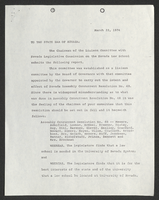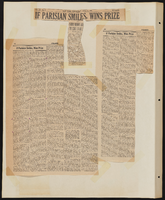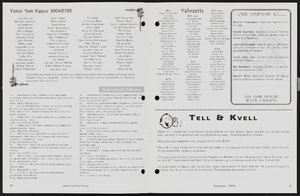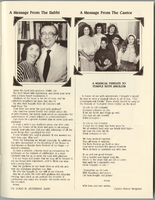Search the Special Collections and Archives Portal
Search Results

Transcript of interview with Norma and Gil Schwartz by Stefani Evans, September 22, 2017, October 4, 2017, & February 14, 2018
Date
Archival Collection
Description
It's been live, love, and laugh ever since we met. We've been married now thirty-three years. Even for a ninety-three-year-old man, thirty-three years is a long time. For Gil Schwartz, thirty-three years is nearly one-third of his life. The former real estate broker, who was raised in Rye, New York, learned the business by working with his father and then forming his own property management company in Manhattan. In 1959, with two children in tow, Gil moved to Las Vegas, where he soon took temporary quarters at Twin Lakes Lodge and he and his children learned to ride horses. In this interview, Schwartz recalls how horseback riding gave him an instant network of friends through working on the annual Helldorado Days and joining the Sheriff's Mounted Posse. He talks about Sahara Realty, the real estate brokerage he founded in 1964 and sold in 1983, and he shares his experiences 1967–68 in negotiating options to buy about one hundred parcels of unimproved land for Herb Nall, who represe
Text

Transcript of interview with Toni Clark by Joanne Goodwin, July 2, 1996
Date
Archival Collection
Description
Toni Clark (born Lena Gaglionese) spent her youth in Seattle, Washington where she was born on April 4, 1915 to Angelene and Salvatore Gaglionese. Her father and mother moved to the Seattle area when they immigrated to the United States from Naples, Italy years earlier. Salvatore worked as a street cleaner for the city of Seattle and Angelene cared for the house and family until her early death. Toni grew up with three siblings, her father and step-mother, and an uncle and cousins next door. After attending Seattle’s Franklin High School for three years, she left. “I just didn’t like school so I quit,” she said, and spent the next couple of years at home. From these simple origins, Toni became “the first lady of Las Vegas” as some admirers called her, referring to the role she played in the transformation of Las Vegas from a frontier town into a glamorous resort town during the 1950s and 1960s. In 1941, before the Second World War began, Toni traveled to San Diego to visit friends and decided to stay. After a year of caring for a young boy, she moved into the Barbara Worth Hotel which was owned by Wilbur Clark. Clark’s father ran the hotel and suggested that Toni apply for a job at his son’s new bar and restaurant, the Monte Carlo. She had not met Wilbur Clark at the time and her shyness dissuaded her from making the move. Nevertheless, she did apply and went to work as the hostess of the Monte Carlo in downtown San Diego. Wilbur and Toni’s courtship began slowly. He gave her the name Toni, saying she “looked more like a Toni than a Lena,” and she kept it. In 1944, around the time Wilbur Clark relocated to Las Vegas where he had purchased the El Rancho Hotel, the couple married in Reno, Nevada and permanently made Las Vegas their home. Clark’s involvement in Las Vegas clubs and gambling expanded with the Monte Carlo downtown and the Player’s Club on the strip. But his dream to create a luxury resort hotel came to fruition when the Desert Inn opened in 1950. The fifth major property on the strip, the Desert Inn had several features that distinguished it from other places. The Skyroom offered a private club atmosphere for talking, music, and dancing. The Monte Carlo Room served French cuisine. The Doll House provided round-the-clock childcare for children of hotel guests. The Painted Desert Room, the property’s showroom, featured top performers and the Donn Arden Dancers. All these features combined to create a resort that offered guests an exquisite setting for a gambling vacation. Toni Clark had a special place at the heart of the Desert Inn’s social life. She brought a gracious and elegant charm to social events associated with the property. Although she said she was never involved in the business of the hotel-casino, she played a unique role setting a new tone for the enterprise. She entertained guests and dignitaries at the hotel as well as her home; organized fashion shows featuring the top designers of the time for the wives of high-rollers; and created celebrations of special events, notably her husband’s late December birthday, with annual parties. When Wilbur Clark died in 1965, Toni Clark remained active in the city’s social life. She did not disappear as others had, but continued to plan and attend social functions. As part of her service to the community, she took particular pleasure in her work with the Variety Club. She continued to reside in Las Vegas until her death in 2006.
Text

Michael Green oral history interview: transcript
Date
Archival Collection
Description
Oral history interviews with Michael Green conducted by Barbara Tabach on February 26, 2018 and April 04, 2018 for the Southern Nevada Jewish Heritage Project. In the first interview, Green discusses his family background and growing up in Las Vegas, Nevada. He talks about his Jewish ancestry and the significance of religious communities in Las Vegas. In the second interview, Green discusses the growth of the Jewish community in Las Vegas, and the history of the Jewish heritage in Southern Nevada.
Text

Nevada Law School Liaison Committee report and Law School Advisory Board correspondence
Date
Archival Collection
Description
Folder contains a report from the Liaison Committee with the Nevada Legislative Commission on the Nevada Law School, and Law School Advisory Board correspondence. From the University of Nevada, Las Vegas William S. Boyd School of Law Records (UA-00048).
Text

Oscar and Carolyn Goodman oral history interview: transcript
Date
Archival Collection
Description
Oral history interview with Carolyn G. and Oscar B. Goodman conducted by Claytee D. White on October 18, 2014 for the Southern Nevada Jewish Heritage Project. In this interview, Carolyn G. and Oscar B. Goodman discuss their early childhoods and education. They tell the story of their marriage, family life, and careers. The Goodmans go into further detail on the growth of Las Vegas, Nevada as a community as well as a tourist destination.
Text




